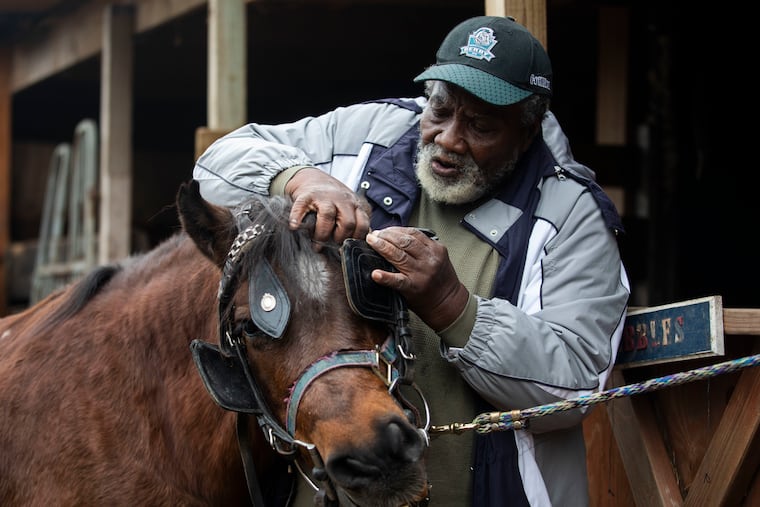As Netflix’s ‘Concrete Cowboy’ premieres, two Philly riding groups could benefit
The Fletcher Street Urban Riding Club took to Instagram to explain that their GoFundMe campaign isn’t related to the movie.

After the Philly-filmed Concrete Cowboy premieres Friday on Netflix, viewers across the world may be moved to open their wallets to help the real-life riders of Philadelphia’s Fletcher Street to continue a tradition that goes back a century, and that in recent years has been threatened by gentrification.
At least two GoFundMe campaigns exist to preserve that legacy. One, titled, “Help FSURC Get Back in the Saddle,” is for the Fletcher Street Urban Riding Club, a group founded by Ellis Ferrell in 2004 that is associated with the Strawberry Mansion-based stables.
That effort, which is not connected to the film, began about nine months ago and as of Thursday afternoon had raised more than $37,000 of its $100,000 goal. It is aimed at helping the club provide “free access to horses and riding instruction to anyone willing to learn.” The money, the club says, would go to things like hay, feed, and medical care for the horses, as well as building materials for repairing stalls and fences.
The other, “Raising $ for a Permanent Stable,” benefits the Philadelphia Urban Riding Academy, a group that was established in January 2019, in partnership with Concrete Cowboy producers. Its goal is to “preserve the life, legacy, and culture of Black urban cowboys in the city of Philadelphia.” It’s hoping to raise $2 million for what’s envisioned as a permanent home, with pasture land, for stables from across the city that have been squeezed out of their homes by development. As of Thursday afternoon, the campaign had raised almost $32,000 since it began March 22.
On Wednesday night, the Fletcher Street Urban Riding Club posted a statement on its Instagram account, expressing concern that Concrete Cowboy viewers might think the film was based on the club, and that confusion with the other GoFundMe campaign might hurt its own fund-raising efforts. It said that Ferrell in recent weeks “has been contacted by several sources who assumed that the film was based on his true life experiences.”
Some have also thought he was behind both campaigns, Ferrell said in an interview Thursday. “They’re thinking you’re getting a lot of money two ways … I don’t want them thinking this is some kind of fraud.”
» READ MORE: How Idris Elba turned a surprise Philly encounter into ‘Concrete Cowboy’
He said he also doesn’t want people who donate to the Philadelphia Urban Riding Academy thinking they’re doing it in support of his club.
The movie, parts of which were filmed on and around Fletcher Street, has been marketed as including Fletcher Street riders in its cast, but it does not refer to the club, specifically. Based on Ghetto Cowboy, a young-adult novel by Greg Neri, it’s the fictional story of a father (Idris Elba) and his estranged son (Caleb McLaughlin, Stranger Things), and is set in North Philadelphia.
Neri, who appears to have donated to both campaigns, had also set his story in Philadelphia. In the afterword to Ghetto Cowboy, he wrote that “though this story is fiction, it’s inspired by the real-life horsemen of North Philadelphia and the Brooklyn-Queens area,” and referred specifically to “the folks on Fletcher Street in Philly.” His acknowledgments include Martha Camarillo, “whose amazing photography book Fletcher Street captures the real spirit of that community” and “Ellis [Ferrell] and the horsemen of Fletcher Street for really caring about these kids and the community.”
Erin Brown, the executive director of the Philadelphia Urban Riding Academy, said Thursday that someone doesn’t have to be part of Ferrell’s club to be considered a Fletcher Street rider.
“That [club] did not exist when I started riding on Fletcher Street in 1990,” Brown said. Beginning at age 6, she rode at the now-defunct Strawberry Mansion Equestrian Center. She went on to ride in competitions, and works as a civilian employee of the Philadelphia Police Mounted Unit.
Brown said “there is open conversation” with the city about where a future facility could be located, and that that site could possibly be in West Philadelphia.
“It’s not just Fletcher Street [that’s in trouble]. There are backyard stables that still exist” in other parts of the city that are threatened by development, she said. “In the event that they’re affected by gentrification or they have to relocate ... we are here for them.”
At one point, Brown said, “there were like 35-plus backyard stables in Philadelphia.” As for what $2 million might buy, “we’re talking about a facility with 20 to 25 stalls and ... actual pastures,” Brown said.